Instead of introducing my self, I have made my life easier and chose this articles
Philadelphia Inquirer
Monday, March 3, 1997
Hebron descendants decry actions of current settlers
They are kin of the Jews ousted in 1929.
By Alan Sipress
INQUIRER STAFF WRITER
RA'ANANA, Israel -- Yona Rochlin pages through the thick Hebrew volume, caressing the history of her
beloved Hebron. She pauses at a black-and-white photograph of a man with spectacles and a long white
beard, her grandfather's grandfather, the renowned Elijah Mani, posing in the turban and embroidered robe
of an honored rabbi.
After generations of peaceful coexistence, Rochlin's family left Hebron in 1929, just before anti-Jewish
hatred erupted into Arab riots that left 67 Jews dead. Now she and a growing corps of the city's Jewish
descendants are renewing their links with Hebron.
Their aim is not to reclaim the West Bank city. Instead, after years of anonymity, they are reasserting their
heritage in the face of militant Israeli settlers who moved into Hebron's ancestral Jewish homes after 1979.
``The settlers were holding the history book of Hebron for 30 years,'' Rochlin, 45, said. ``All of a sudden, we
came out of the pages. It must be a nightmare for them.''
These descendants have launched a publicity campaign contesting the right of the 450 current settlers to
speak in the name of the former Jewish community. They are demanding instead that the enclave be
plucked from the heart of Hebron, a city of 120,000 Palestinians.
The settlers live in a portion of Hebron that remains under Israeli army control after a partial troop
redeployment in January. None of the settlers is descended from the earlier community. Some are American,
and many others are not native-born Israelis.
``The settlers are a loaded bomb that can blow up peace altogether,'' said Yair Keidan, 46, whose father was
born in Hebron. ``We're not talking about Zionists. We're talking about lunatics, radical fanatics.''
After centuries of exile, Jews started returning to this biblical city in the 13th century. By the 15th century,
they had begun to flourish under Ottoman rule.
The community reached up to 1,500 by the mid-19th century, when the revered, Baghdad-born Rabbi Elijah
Mani arrived. For more than 40 years, he served as chief rabbi, expanding Hebron's Jewish institutions and
winning respect among the Arab population as well.
When he died in 1899, hundreds of Jews and Arabs attended his funeral, according to Rochlin, a former
employee of the airline El Al who now lives in the comfortable Tel Aviv suburb of Ra'anana. She beamed as
she told the story of her ancestors. She said the Muslims so honored Elijah Mani that they tried to declare
him a local saint.
Other Jewish descendants were raised on similar tales of harmony between the Arab and Jewish
populations.
But as the competing nationalisms of Jews and Arabs gained steam in the 1920s, relations between the
groups soured. In 1929, an Arab mob massacred Jewish neighbors and ransacked their homes. Scores of
survivors fled the city.
Amnon Birman, 48, a Jerusalem newspaper columnist whose mother was born in Hebron, recalled that his
great-grandfather, Jonah Tsarfat, saved the family in 1929. A rabbi and mystic, Tsarfat had a dream on the
night before the violence that he should journey to the port of Jaffa and bathe his wife in the sea there to cure
her of rheumatism. They set out before the riots began.
These descendants do not deny the horror of the 1929 massacre, but they are enraged at the settlers. They
accuse the settlers of exploiting the massacre's memory while fostering anti-Arab violence, most notably the
1994 shooting of 29 Muslim worshipers by settler Baruch Goldstein in the Tomb of the Patriarchs.
But Rochlin's family, as well as those of other descendants, chose not to move back. Their homes
subsequently were taken over by the followers of militant Rabbi Moshe Levinger.
In 1979, Levinger's American-born wife, Miriam, led 40 women and children -- in a move unsanctioned by
the Israeli government -- in a predawn foray to occupy Hebron's Beit Hadassah building, which has since
emerged as the center of the Jewish enclave.
Rochlin thumbed through her thick history book and arrived at a copy of an Ottoman land record showing
that part of Beit Hadassah was registered in the name of Rabbi Suleiman Menachem Mani, her
great-grandfather.
Moshe and Miriam Levinger later moved into another home in Hebron's Avraham Avinu complex. According
to Birman, that home once belonged to his great-grandfather.
``We, the moderate people on the Israeli side, are hostages in the hands of these fanatical people, these
trigger-happy people,'' Birman said, warning that the settlers were likely to instigate violence inside Hebron
to torpedo the peace process.
While Birman and his colleagues want the settlers out, these descendants are not bent on regaining their
family homes. They say claiming Jewish property inside the West Bank could set an awkward precedent,
encouraging Arabs to reclaim their ancestral property inside what is now Israel.
Birman, who called that prospect ``very dangerous,'' noted that his house in the Bakaa neighborhood of
West Jerusalem belonged to Palestinians until they fled during the 1948 war.
So far, a petition calling for the settlers to be evacuated from the West Bank city has gained the signature of
about 40 Hebron children and grandchildren.
Rochlin, a sponsor of the campaign, readily admits that some Hebron descendants sympathize with the
settlers. In truth, two generations after the Jewish community was banished from the city, Hebron's offspring
have come to reflect the whole range of views in Israeli society.
But the three-month-old publicity drive, including media interviews and advertising, has drawn attention in
Israel, creating unexpected opposition against the settlers.
Rochlin, Keidan and several other descendants have garnered even more attention by meeting in recent
weeks with Hebron's Palestinian mayor, Mustapha Natshe, and touring the city with PLO Police Commander
Jibril Rajoub.
This cooperation has been sharply criticized by the Hebron settlers. Noam Arnon, a settler spokesman,
accused the descendants of ``bizarre activity to justify those who killed the Jewish community in 1929.''
Arnon said the settlements had received the support of some Hebron offspring and now were home to
several relatives, though no direct descendants, of those who previously lived in the city. He accused those
involved in the petition drive with being agents of ``fanatical movements who want to destroy the Jewish
existence in Hebron.''
``This is just a small group of leftist activists,'' Arnon said. ``They do not represent anything.''
The petition campaigners hold out little hope that Prime Minister Benjamin Netanyahu would heed their call
and remove the Jewish settlers.
But if the homes are evacuated, several descendants have urged that they be dedicated as a museum
commemorating the old Jewish community and a cultural center for Jewish-Arab understanding.
``I can give my house as a present for peace,'' Rochlin said. ``I don't want my son to be killed over my
grandfather in Hebron.''
Philadelphia Online -- The Philadelphia Inquirer, Page One -- Copyright Monday, March 3, 1997
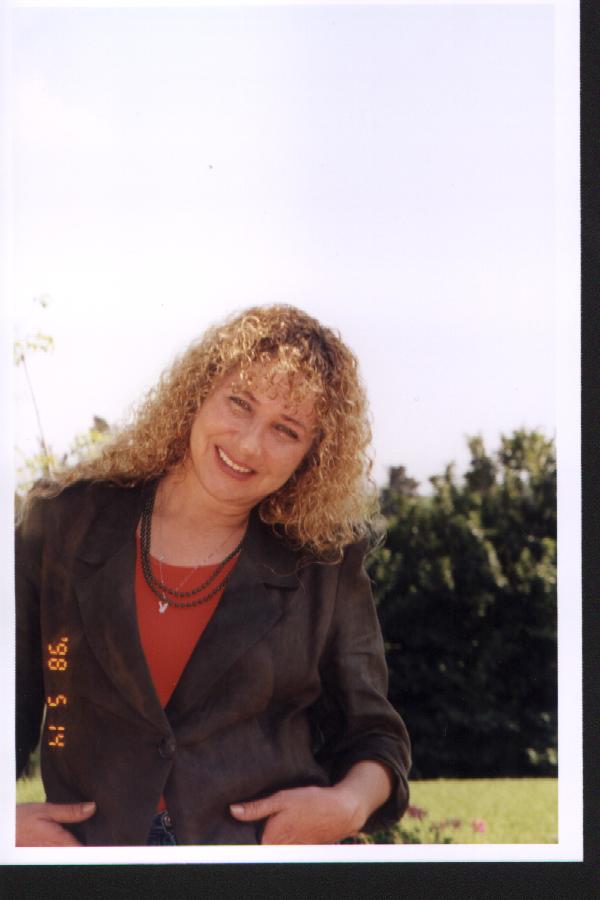
The Christian Science Monitor
A descendant of the city's 500-year-old Jewish community starts a
movement to
restore a tradition of coexistence between Muslims and Jews
Lital Levy
20 May 1997
Until last September, Yona Rochlin had never imagined stepping out from the privacy
of her quiet life in an agricultural village north of Tel Aviv.
But, after that month's bloody clashes between Israelis and Palestinians, something
clicked in her mind: She realized she held a powerful card in the embattled quest for
peace.
Ms. Rochlin is descended from two illustrious families of the 500-year-old Jewish
community of Hebron, the city now considered a virtual powder keg in the West
Bank. Just as diplomatic efforts were being made to rescue the Middle East peace
process this month, violence erupted in Hebron between hundreds of stone-throwing
Palestinian youths and Israeli soldiers firing rubber bullets.
The old Jewish community in Hebron was shattered during two days of pillage in
1929, when rioting Muslims killed 67 Jews. British officials ordered all survivors to
leave the city; neither they nor their descendants ever returned to their homes.
A sense of mission
Now, invoking her Hebronite roots, Rochlin takes a tough stance on the 40 or so
Jewish families whose presence in the city of 120,000 Palestinians is widely viewed
as an obstacle to peace. These settlers, living in what were the old community's
homes, have a sense of divine mission: to revive the Jewish presence in one of
Judaism's holy cities.
But Rochlin sees the matter differently. For five centuries, she says, the city's Jewish
and Muslim populations lived in peaceful coexistence. And during the 1929
massacre, 400 Jews were saved by their Muslim neighbors - a fact excluded from
settler accounts.
"The settlers have taken two days and erased 500 years," Rochlin says. "While they
live in Hebron in the name of the old Jewish community, they don't represent its way
of life, which was a way of peace."
Hebron, in fact, faces chronic violence between settlers and Palestinians. During two
weeks this April, Palestinians incensed by Israeli construction in East Jerusalem set
the city aflame. A settler shot dead a Palestinian who he said sprayed him with
chemicals; two more Palestinians were killed and more than 150 wounded in
skirmishes with Israeli soldiers. And recently, Palestinians have expressed outrage at
Israeli plans to destroy hundreds of "unauthorized" Palestinian houses in the Hebron
area.
But in October, Rochlin decided she'd already seen enough. She formed a group of
the old community's descendants who went back to Hebron to meet with Palestinian
officials and tell their own Hebron story.
Twenty-five descendants sent a tremor throughout Israel in November when they met
with Hebron's Palestinian mayor, Mustapha Natshe, to voice support for the peace
process and dissociate themselves from the Hebron settlers.
A few weeks later, two major Israeli newspapers printed a statement, signed by 40
descendants, that called on the government to remove the settlers "at once, before
they succeed in exploding the peace process and destroying the prospects of
peace."
And in another visit in late January, Rochlin and others hinted they might seek to
legally reclaim their grandparents' property and evict the settlers themselves.
Rochlin, who holds a 1910 deed to a building where several settlers live, says she
would establish a heritage museum and Jewish-Arab cultural center in the building:
"Instead of [militant rabbi] Levinger's laundry hanging there, why not have a museum
that will serve the peace?" she suggests.
In the meantime, this homemaker-cum-activist has ignited a national debate, prodding
Israelis to reexamine both their current views of the city and their reading of its past.
Surprising as it is that Rochlin, daughter of a staunch right-wing nationalist family, has
emerged as a peace activist, it is perhaps more surprising that no one had ever
recognized the political potential of a descendant's voice.
Rochlin's first public statement, "I don't want my son to die on my grandfather's grave
in Hebron," made headlines in Israeli dailies and touched many nerves.
Battle at Joseph's tomb
The statement refers to September's gun battle between Israeli soldiers and
Palestinian police at Joseph's tomb in Nablus, where the Israeli soldiers were trapped
for two days in a small Jewish seminary at the site. "Like many Israelis," Rochlin says,
"I was traumatized by this event. I saw young men dying to protect a handful of
religious fanatics who insist on sitting at a grave in a totally Arab city." Her words
resonated in a large sector of Israeli society but infuriated those who believe the site
is holy.
Rochlin, who is now studying political science and sociology, admits that becoming a
public figure has been a "great change" for her personally, as well as for her husband
and two children, ages 10 and 13. "I'm afraid that my family wasn't very happy with it -
they're used to a peaceful life," she says. But, she adds, "I had to make the choice."
She and others in her group of descendants say that Hebron is in their blood and
souls, and that they, not the government or the settlers, should have the final say on
how things should be - and can be - in Hebron.
* Lital Levy is an Israeli-American journalist based in Jerusalem.
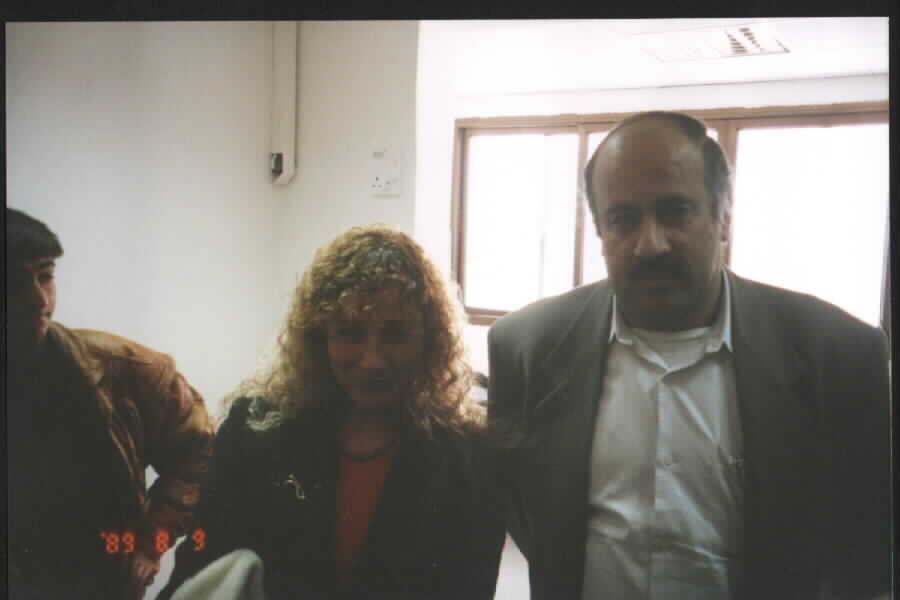 Jibril Rajoub and Yona
Jibril Rajoub and Yona
Haaretz
Descendants of
the Old Jewish Community in Hebron Extend Greetings to Rajoub on "Liberating Part of the City"
Sammy
Sokol Ha'aretz January 26, 1997
A delegation of descendants from the old Jewish community of Hebron met in Hebron two days ago
with Jabril Rajoub, head of the Palestinian Security Services in the West Bank, and extended greetings
upon the entrance into the city of the Palestinian Authority. "Upon the partial liberation of Hebron, we came
to extend our wishes as descendants of the Jews who lived in Hebron for hundreds of years. We are Jews
and Israelis and also Hebronites the children of Hebronites, and we want to rebuild the partnership that
existed in the past between Jews and Arabs", declared Chaim Hanegbi (of the Bajaio family), a member of
the Association of Hebron Descendants. Rajoub extended his greetings to "our Hebron brothers" and said
that the visit is proof that peaceful coexistence is possible between the two peoples.
Yona Rochlin (daughter
of the Mani and Hasson families) showed a Turkish property deed from 1910 according to which the second
floor of the Hessed Avraham Hospital (today known as Beit Hadassah) [where Rabbi Moshe Levinger and
other settlers live] was owned by her family. Hanegbi said that the Association opposes Jewish settlement in
the city; he revealed that the Association recently met with Attorney Danny Seidman in an effort to use legal
means to evict the settlers from the property owned by Hebron Jews.
Prior to this, members of the
Association met with Mustafa Natshe, mayor of Hebron. At the meeting, they suggested establishment of an
institute to research the common culture and heritage of Jews and Muslims who resided in Hebron [on
property previously owned by Jews]. Hanegbi protested the use made by settlers of the memory of the 1929
pogrom victims and said that they are distorting the Jewish-Arab heritage in the city and ignoring the
Muslims who protected Jewish families. In response to the question of whether the Palestinian Authority
would allow Jewish descendants of Hebron to return to the city and their property, Rajoub replied, "That's up
to them. The chairman has said that whoever wants to live under Palestinian sovereignty and the
Palestinian Authority is entitled to do so without religious or racial discrimination."
Yediot Aharonot
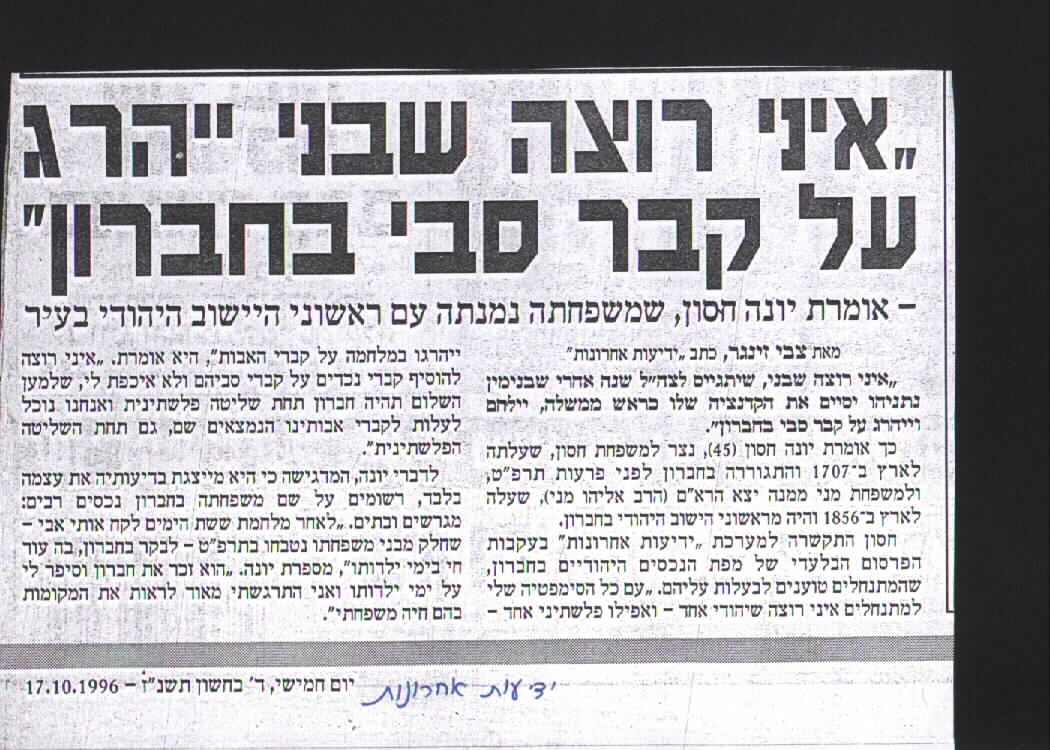
Al Hayat Al Jadida
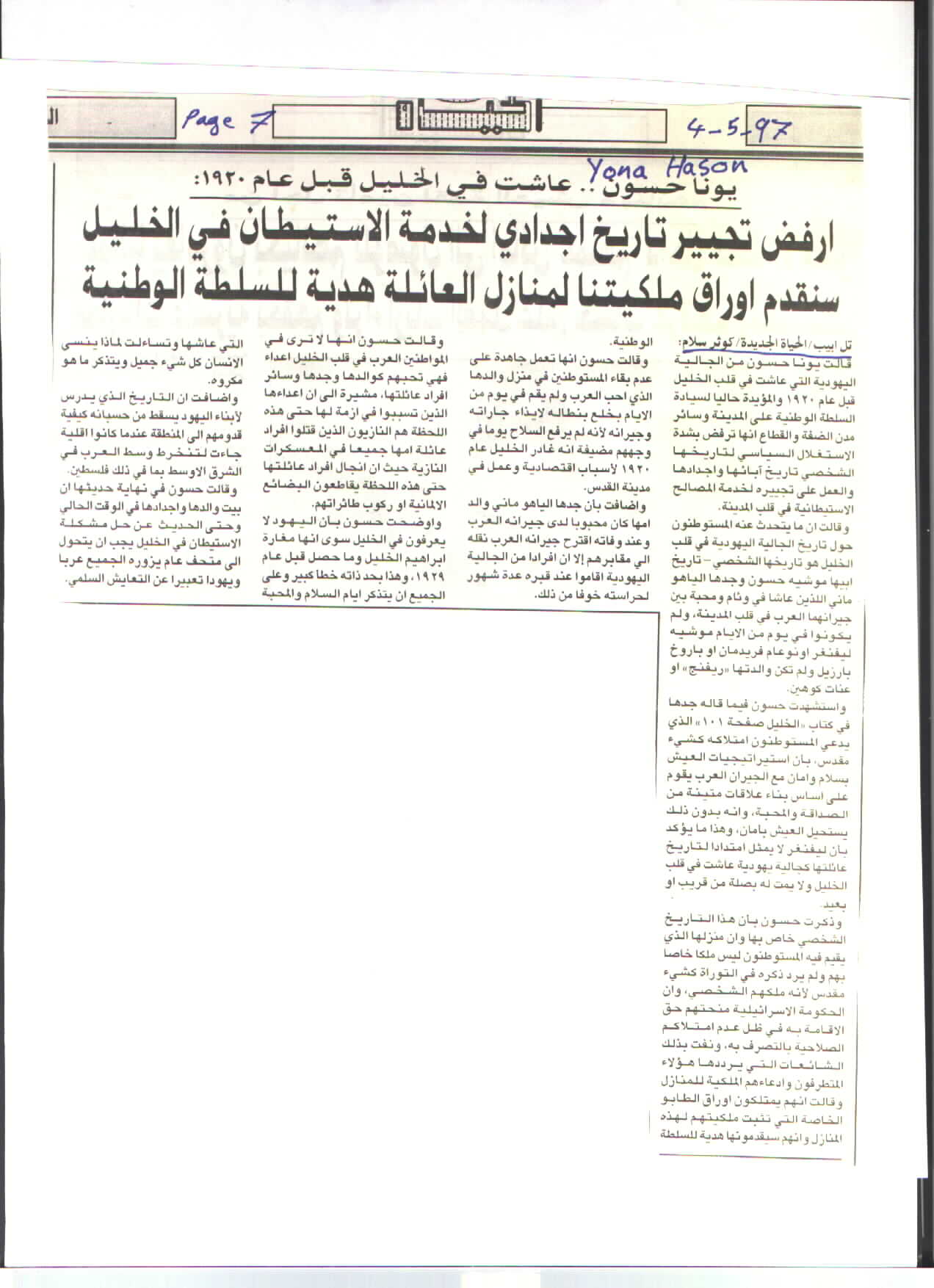

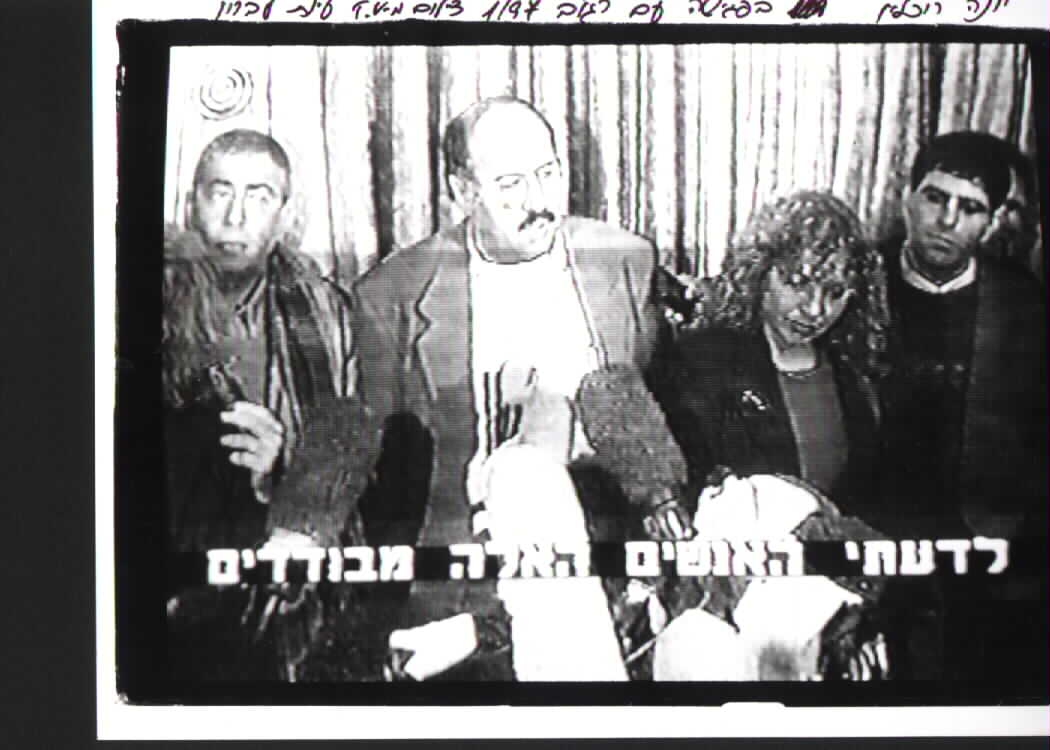
SEEK PEACE OF HEBRON
We, descendants of the families of Hebrons ancient
Jewish community - sons, daughters, grandchildren,
and great grandchildren of the Jews who lived in
Hebron for hundreds of years - want peace.
Peace for the Land, Peace for the country
At a time when the city of our forefathers and foremothers is in the eye of a storm
threatening to explode the political process and to destroy the prospects of peace,
we feel an obligation to say what is in our hearts.
Settlers living in the heart of Hebron do not have the right to speak in the name of
the old Jewish community. Their pretensions to be representing following the way of
our parents isdeceitful. These settlers are alien to the way of life of the Hebron Jews,
who created in overthe generations a culture of peace and understanding between
peoples and faiths in the city.
The settlers who took possession of Jewish property in the heart of Hebron in the
name of our families, and our heritage are being disthonest. No one gave them the
right to inherit our parents, whether private or community property. And they intend
to add to their crime by taking possession of additional land and property.
Hebron is critical to peace
Therefore, the government must evacuate the handful of settlers from the city at
once, before they manage to explode the peace process and destroy the prospects
for peace.
Signed: Amnon Bierman (Zarfati family)
Ahuva Donivsky (Zarfati family)
Ronen Doron (Slonim family)
Yael Doron (Slonim family)
Yisrael Finkelstein (Aienhorn family)
Becky Freistadt (Gershon family)
Moshe Gelmor (Hasson family)
Rachel Grundland (Zarfati family)
Chaim Hanegbi (Bajaio family)
Michal Hasson (Hasson family)
Ovadia Hasson (Hasson family)
Tamar Hasson (Hasson family)
Orit Hasson-Walder (Hasson family)
Chaim Hazan (Avishar family)
Etty Horn (Franco family)
Avner Horowitz (Mani family)
Tamar Horowitz (Mani family)
Rachel Kadishson (Turgeman family)
Yair Kidan (Schneirson family)
David Maroz (Schneirson family)
Dafne Mendelowitz (Zarfati family)
Asher Meshorer (Mani family)
Miriam Morris (Lazarowski, Gotlevski families)
Vered Nevo Slonim (Slonim family)
Batya Perla (Kleiers family)
Yonah Rochlin (Mani, Hasson families)
Michal Rosenzweig-Goffer(Mani, Hasson families)
Eliezar Shani (Slonim family)
Sima Schneider (Slonim family)
Meir Slonim (Slonim family)
Ora Slonim (Slonim family)
Ofra Yerushalmi-Seidof (Zarfati family)
Contributions are gratefully accepted to support publication of this statement:
Hebron, POB 29828, Tel Aviv 61297, Israel
 Hebron diary, Article about a new movie
Hebron diary, Article about a new movie
Email: yona@netvision.net.il

 Jibril Rajoub and Yona
Jibril Rajoub and Yona



 Hebron diary, Article about a new movie
Hebron diary, Article about a new movie